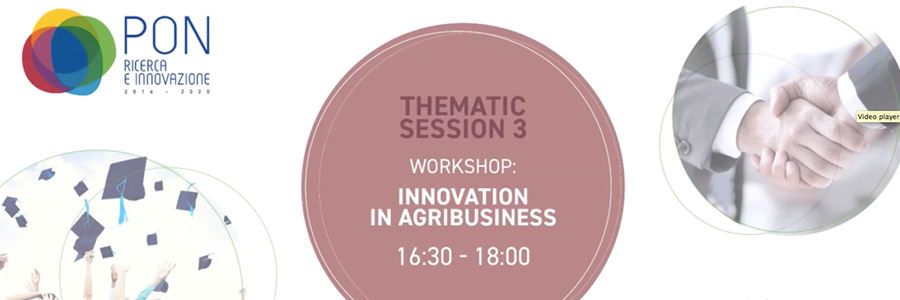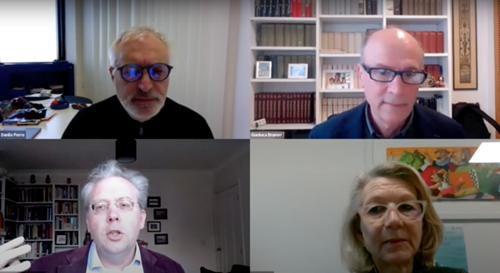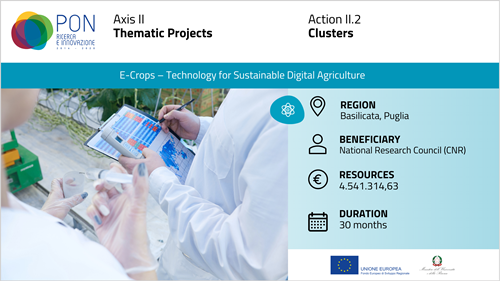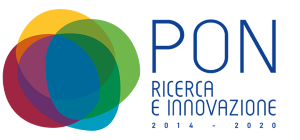The report of the workshop held as part of the NOP Research and Innovation event

ITA | ENG
Bringing together different Agribusiness actors such as farmers, researchers, experts, businesses, environmental groups, consumer interest groups or other non-governmental organizations to advance innovation in the agricultural and forestry sectors was the objective of the Innovation in Agribusiness workshop held on 22 February 2022 during the NOP Research and Innovation annual event 2014- 2020 organized by the Ministry of University and Research in collaboration with the European Commission’s University Business Forum.
 The initiative was moderated by Danilo Porro, Professor at the University of Milano-Bicocca and National Contact Person for Cluster 6, Pillar II of Horizon Europe Research and Innovation Programme, who called attention to the gap between the expected growth of the world’s population in the coming years and the availability of food resources that is not growing accordingly.
The initiative was moderated by Danilo Porro, Professor at the University of Milano-Bicocca and National Contact Person for Cluster 6, Pillar II of Horizon Europe Research and Innovation Programme, who called attention to the gap between the expected growth of the world’s population in the coming years and the availability of food resources that is not growing accordingly.
With this in mind, Maarten van der Kamp, Director of Education at EIT Food, the European Institute of Innovation and Technology for the food sector, took stock of the main challenges that the food system has to face today, underlining on one hand the great impact that the sector has on the environment, in terms, for example, of greenhouse gas emissions and water waste, and on the other hand its low propensity for innovation. After reviewing the main objectives around which EIT Food brings together industries, universities, research centres and startups, van der Kamp focused on some particularly interesting solutions promoted by the Programme, such as Orbem – an Artificial Intelligence-based technology for the poultry industry, able to revolutionize the way we produce food – and new products, including innovative snacks that make the most of food waste, offering alternative sources of protein.
Other good practices for the evolution of the food sector were presented by Paola Pittia, Professor at the University of Teramo and project coordinator of Erasmus + Knowledge Alliance “AskFood”, (Alliance for Skills and Knowledge to Widen Food Sector-related Open Innovation, Optimization and Development). The initiative focuses on the development of training methodologies to build the new skills required by the food sector, promoting better interaction between academia and industry and the development of an entrepreneurial mindset in the new generation of graduates. With this in mind, the project promotes the creation of a new training ecosystem for innovation and sustainability in the food sector with various tools: an online forecast aggregator designed to outline scenarios and trends that will affect the skills required by the sector in the near future; an interactive training gap identifier; an open repository for information, best practices and knowledge in the sector; a “reversed” incubator, an innovative methodological approach to training that aims to bring together academia and industry in a challenge-based logic, offering pathways for the development of innovative solutions and ideas. To strengthen the links between the different actors in the sector and foster their collaboration, the project has developed a cross- industry digital ecosystem for training and business and an observatory for the promotion and development of innovation-oriented training activities for the food sector.
Innovation was also the focus of the contribution by Gianluca Brunori, Professor of Food Policy, University of Pisa, and coordinator of DESIRA (Digitization: Economic and Social Impacts in Rural Areas), a project funded under the EU Horizon 2020 Programme. Starting from the debate on the mechanisms and objectives of innovation, Brunori stressed the importance of considering digital technologies as a means and not an end, proposing a reversal of perspective that can help to focus on the issues to be addressed in the rural context and to identify innovation paths for sustainable development. Rather than relying on a linear, bottom-up innovation model, prevalent in rural contexts, the DESIRA project adopted an interactive approach to innovation, involving different actors and open to interdisciplinarity. With this in mind, the project promoted the establishment of 20 living labs across Europe. These are networks of farmers, knowledge intermediaries and policymakers, built around an emerging issue and aimed at developing solutions in a collaborative way. Brunori talked about the Toscana Nord living lab which aims to introduce different types of technologies for flood management and the assessment of the potential involvement of citizens and farmers in land monitoring.
 Digital technologies are also the focus of E-CROPS, a project funded by the NOP Research and Innovation 2014-2020 under the industrial research and experimental development projects in the 12 Smart Specialization areas. This Agrifood project, presented by Beniamino Gioli, National Research Council (CNR), aims to develop digital and sustainable Agriculture 4.0 in Southern Italy through the development of new sensors for crop and risk management and pilot applications to validate technologies and provide farmers with decision support tools for more efficient and sustainable crop management. The main challenge is to bring together different worlds – ICT companies and farms – creating the conditions to enable farmers to use the technologies developed. Given the multidisciplinary nature of the project, the CNR, involved in the project through various research institutes across Italy, has played an important role as a facilitator between partners in the technology and agricultural sectors. After presenting in more detail the wide range of sensors developed, the detection and phenotyping platforms and the decision support tools for crop management, Gioli underlined the importance for such a large project aimed at introducing new technologies in farms to be able to address different contexts: “Not all farms are the same, a lot depends on the size and level of expertise of each farm. With this project, we have managed to bring together farms of different sizes, from the largest Italian farm to small farms growing single crops.”
Digital technologies are also the focus of E-CROPS, a project funded by the NOP Research and Innovation 2014-2020 under the industrial research and experimental development projects in the 12 Smart Specialization areas. This Agrifood project, presented by Beniamino Gioli, National Research Council (CNR), aims to develop digital and sustainable Agriculture 4.0 in Southern Italy through the development of new sensors for crop and risk management and pilot applications to validate technologies and provide farmers with decision support tools for more efficient and sustainable crop management. The main challenge is to bring together different worlds – ICT companies and farms – creating the conditions to enable farmers to use the technologies developed. Given the multidisciplinary nature of the project, the CNR, involved in the project through various research institutes across Italy, has played an important role as a facilitator between partners in the technology and agricultural sectors. After presenting in more detail the wide range of sensors developed, the detection and phenotyping platforms and the decision support tools for crop management, Gioli underlined the importance for such a large project aimed at introducing new technologies in farms to be able to address different contexts: “Not all farms are the same, a lot depends on the size and level of expertise of each farm. With this project, we have managed to bring together farms of different sizes, from the largest Italian farm to small farms growing single crops.”








